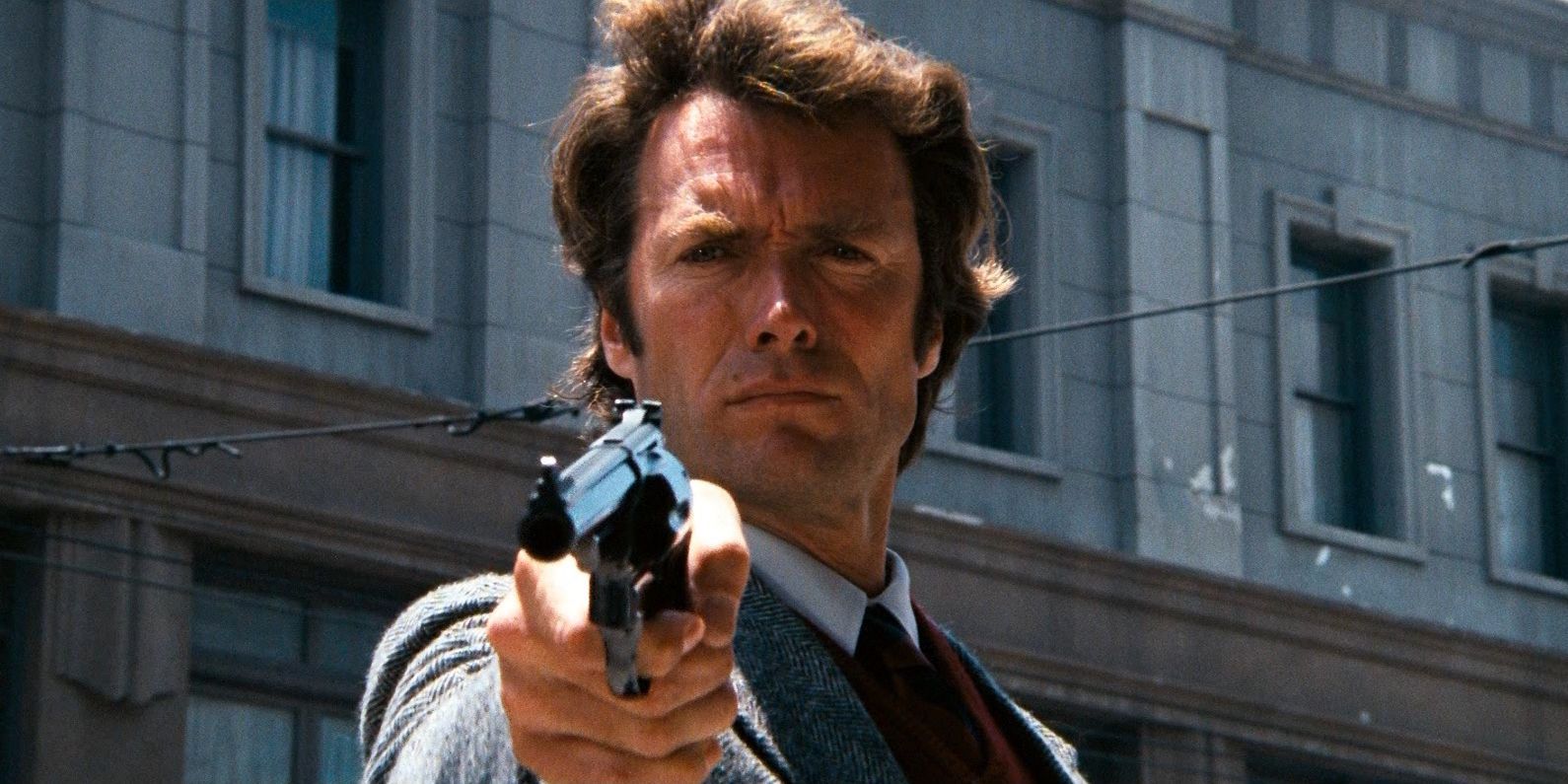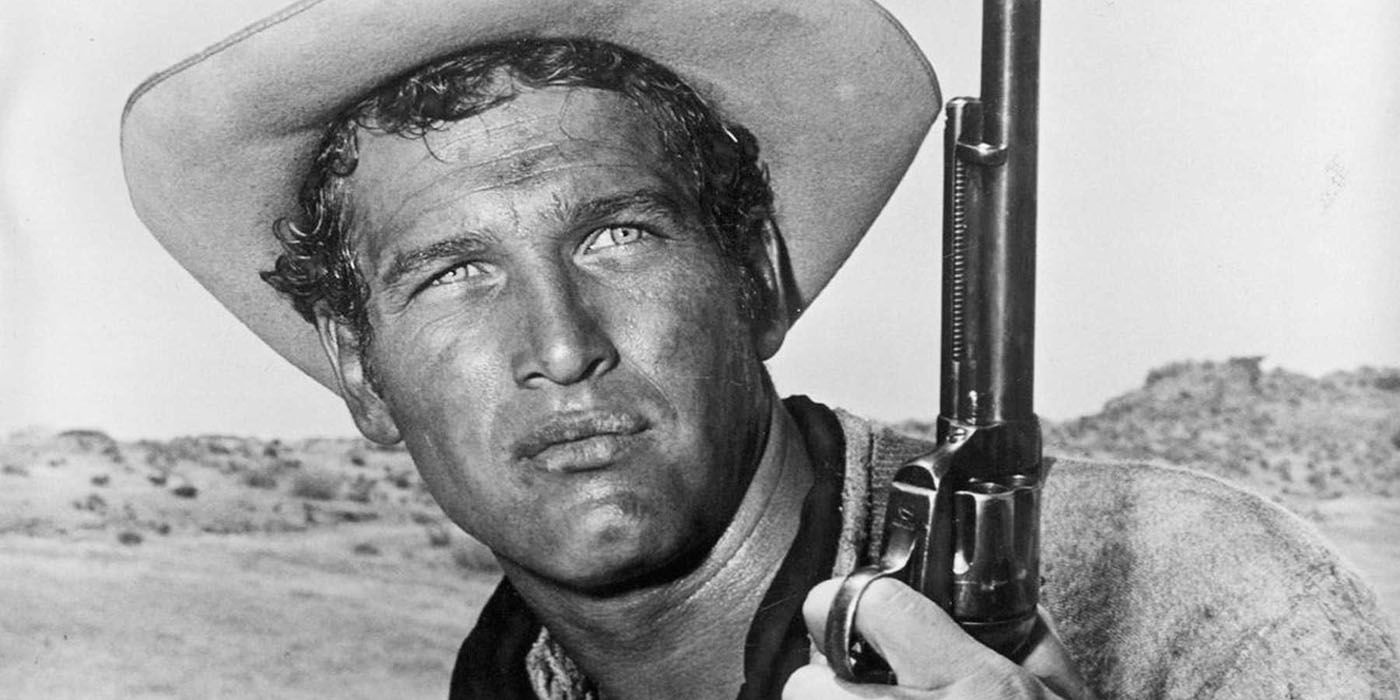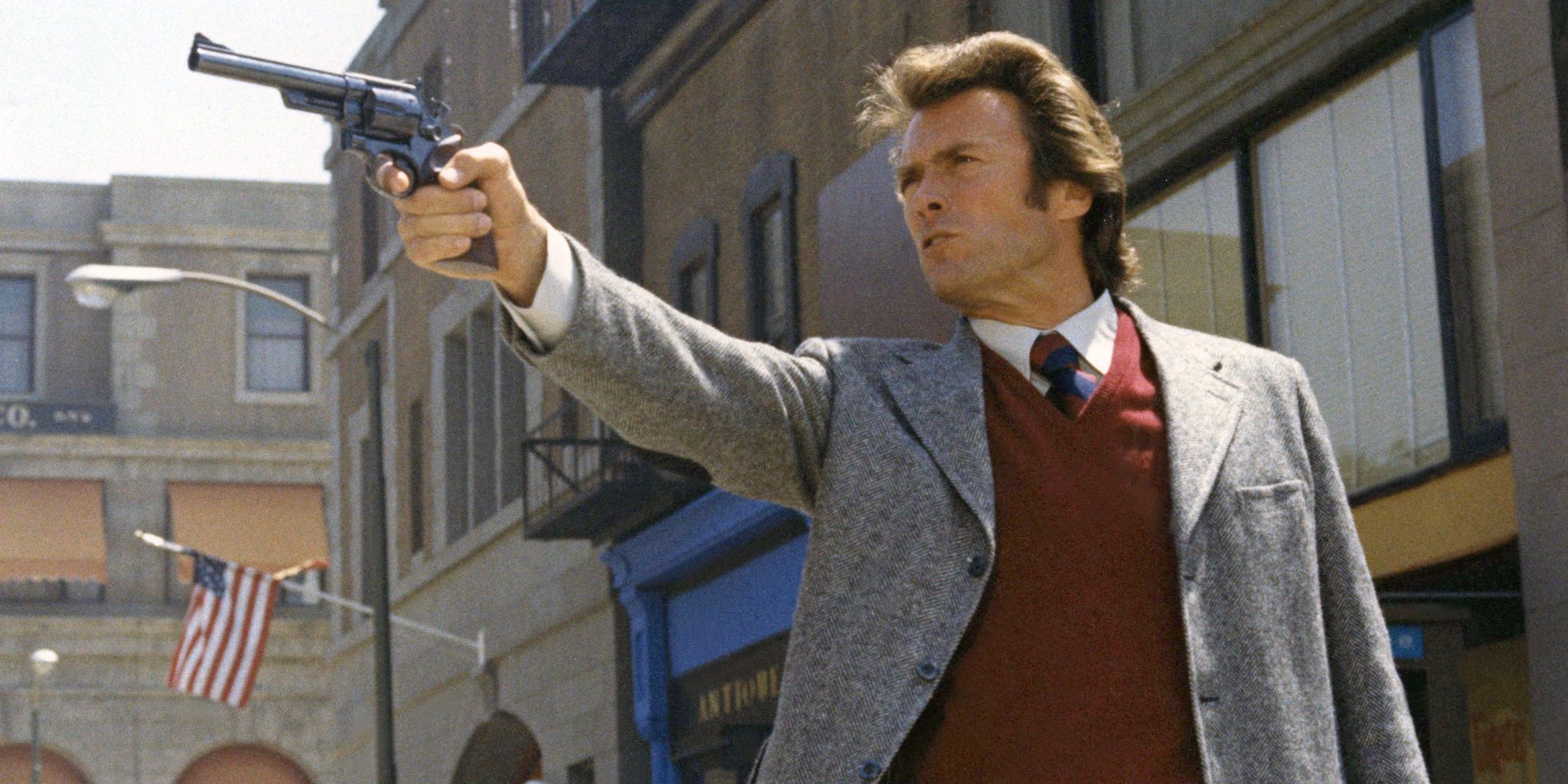Clint Eastwood
The Enforcer: The very entertaining third ‘Dirty Harry’ film has lots of humor, exciting action sequences and a female partner for Clint Eastwood’s supercop

The Enforcer(1976), the third film in the ‘Dirty Harry’ series, is directed by James Fargo. The film pairs Clint Eastwood with Tyne Daly, and it contains a lot more humor along with all the elements that made the first two films great entertainment.
After incurring the wrath of his superiors for the nth time – for speaking his mind, questioning their tactics, going against their orders, using excessive force, etc. etc., Inspector Harry Callahan (Clint Eastwood) of SFPD is suspended from the force, and asked to turn in his badge (and that too in the middle of a commendation ceremony; only Harry can manage to get suspended in the middle of a commendation). Harry angrily obliges, and pulls out his badge and hands it to Capt. McKay (Bradford Dillman), with a snarky remark: Here’s a 7-point suppository, Captain!
Capt. McKay [stunned]: WHAT did you say?
Harry Callahan [angrily, clenching his teeth and rolling his eyes in typical Clint Eastwood fashion]: I said STICK IT IN YOUR ASS!
Ha ha ha………, of all the witty quips, punchiness and legendary monologues delivered by Clint Eastwood as Harry Callahan (or otherwise), this little conversation from the third “Dirty Harry” film, “The Enforcer(1976)” is the one I find the funniest. It never fails to crack me up, no matter how many times i have seen it. “The Enforcer” also happens to be the funniest of all “Dirty Harry” films. There are witty punchlines and situational humor galore(a lot of it smooth, some rather forced). “The Enforcer” is a solid entry in the “Dirty Harry” franchise, but also an odd one. Harry is still the non-nonsense, take-no-prisoners, take-no-guff-from-superiors supercop who effectively uses his Magnum 44 to end all evils in the society, but the film looks and feels pretty different from the rest of the films in the franchise, and perhaps, intentionally so. It’s more lighthearted, and hence much more entertaining than any of the other films, but artistically and thematically lightweight.

After the gritty, violent and very popular urban vigilantism of the first “Dirty Harry” in 1971- which generated a lot of controversies by the way, star\producer Clint Eastwood (and his collaborators) toned down the violence and vigilantism for the second film, “Magnum Force(1973)“- going in for a more expansive, glossy film with a relatively softer (and romantic) Harry Callahan- what with girls throwing themselves at him left, right and center. So I guess for the third film, they decided to amplify the humor quotient, and, perhaps, keeping that in mind, they have also made the alpha-male, (and casually sexist\racist) Harry’s partner a woman; Thus, turning the film into a fun buddy-cop flick. Harry’s partner is Inspector Kate Moore (Tyne Daly). Their first encounter was rather unpleasant; Harry was one of Kate’s interviewers during Harry’s stint in ‘Personnel’- Harry was transferred out of Homicide for using excessive force to resolve a hostage crisis. A seething Harry, who do not much like the presence of females in the field- more for their lack of field experience (mind you!) rather than for their gender, tried his best to intimidate, and disqualify Kate from getting the promotion, but she managed to come through. But what Harry did not expect was Kate ending up as his partner, just when he’s reassigned to Homicide. Harry’s partner, DiGiorgio (John Mitchum), was killed by a gang of urban terrorists, who calls themselves People’s Revolutionary Strike Force (PRSF), lead by Bobby Maxwell (DeVeren Bookwalter), when DiGiorgio tried to stop them from stealing M72 LAW rockets and other weapons from a warehouse. Now Harry is tasked with apprehending the gang.
The initial portions of Harry and Kate’s police work unfolds as expected, leading to much of the humor in the film. Kate, who has very little experience in fieldwork, makes a fool of herself wherever she goes- much to exasperation of Harry, who has to come to her rescue again and again: While watching an army demonstration of the LAW rocket on a firing range, Harry must abruptly yank the seemingly oblivious Kate out of the path of potentially lethal missile backfire; while visiting the Hall of Justice to sit in on an autopsy on a security guard killed in the robbery, Kate gets queasy and runs out of the room; whether chasing a suspected bomber across town, or dealing with a Black militant leader (and his followers) at his den, Kate is found wanting. But their relationship takes a turn for the better when Kate supports Harry after he’s suspended from force for not participating in a farcical ‘Commendation ceremony’ organized by a publicity-seeking Mayor (John Crawford) to commend Kate and Harry for solving the PRSF case – when the duo had’nt done anything like that. Harry had tracked the suspected bomber to militant leader, “Big” Ed Mustapha (Albert Popwell), but when he realizes that he’s not linked to PRSF, Harry makes a deal with Ed for information about the terrorist organization. And no sooner had Harry left Ed’s den, the stupid, Capt. McKay raids the place and arrest everyone, including Ed, for the crimes committed by PRSF, and pronounces that the case is solved. But McKay convinces the Mayor to give the credit for the operation to Harry and Kate, as it will bolster the Mayor’s image for promoting a female cop. An angry Harry, whose credibility with Ed was damaged on account of McKay’s actions, refuse to take part in the televised farce, and walks away turning in his badge.
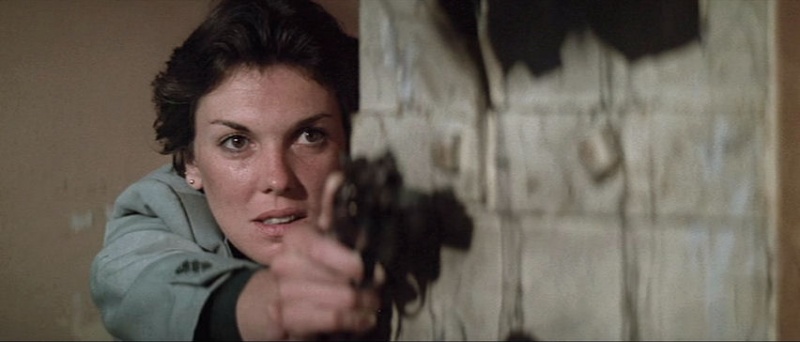
Kate too walks out with Harry, and does not join the Mayor in meeting with the journalists. Kate’s act of supporting him – risking her own position in the department – earns her Harry’s respect. The two bond over a few beers, and Kate offers (now suspended) Harry her her help in gathering information on the case; they now start working as a proper team, with Harry, finally, accepting her as an equal partner. Harry does not remain suspended much long though, as PRSF strikes again, this time kidnapping the Mayor. The city once again needs Harry, and as usual, as McKay and others decides on meeting the terrorists’ demands, Harry and Kate get to work: with the help of Ed, they trace the location of the terrorists to Alcatraz. The cop-duo mounts a surprise attack on the (formerly) prison-island, with Kate proving herself to be courageous and resourceful during the operation. She manages to locate and free the Mayor, and as she’s escorting him out of the island, she finds Harry n a perilous situation. In an attempt to warn Harry of an impending attack, Kate has to sacrifice her life- ruthlessly machine-ɡսոոеԁ down by Maxwell. A vengeful Harry pursues Maxwell to one of the watchtowers, and kills him by blowing it up with a LAW rocket. The film ends with Harry standing guard over Kate’s corpse, while in the background we hear McKay (unaware of Maxwell’s ԁеаtһ) in a helicopter (announcing via PA) agreeing to all of Maxwell’s demands.
While watching “The Enforcer,” one is amazed at how much the “Dirty Harry” film had changed in just 5 years, and in the course of 3 films. The original was one of the greatest cop\crime thrillers ever made, with the great director Don Siegel’s gritty, minimalist, neo-noir sensibilities on full display. That film was a lean, mean, intense police-procedural, which concentrated totally on a cat & mouse game played between a maverick cop and an out-of-control, Psychopathic killer. Harry’s habit of ‘breaking the rules, while obsessively pursuing criminals, is explained away by the fact that it was unavoidable while dealing with perverse criminals like “Scorpio”- actually, one of the truly great and scary villains in Crime movies. But by the time “The Enforcer” was made, the grittiness has all but vanished from the films, replaced with an extreme emphasis on making a stylish comical entertainer in the mold of “James Bond” films. The villains have become cartoonish and Harry’s bureaucratic superiors are reduced to nothing more than laughable stereotypes. Even Harry Callahan has undergone a radical change; for starters, he doesn’t even dress the way he did in the first film; this time Harry going for some cool, stylish informal wear. Harry’s individualism and maverick sensibilities are reduced to mere style statements; this is more than obvious in his introduction sequence. Like all “Dirty Harry” films, this one too gives Harry a flashy introduction, where he showcases his own brand of ‘Law enforcement’. In this case it’s a liquor-store holdup: the robbers are demanding a car with a police radio; Harry provides one by driving his squad car into the store and then ѕһootıոɡ down the robbers. The result: $14,379 in damages that’s billed to the SFPD, and Harry gets transferred to ‘Personnel’; Harry screams that Personnel “is for A-holes,” to which McKay angrily reacts that he himself served in Personnel for ten years, and Harry ԁеаԁраոѕ “Yeah”- generating the first big laugh in the movie.
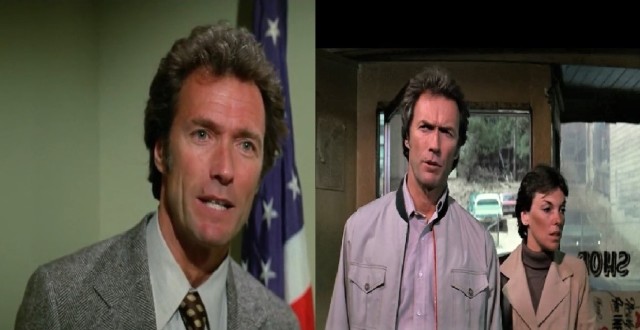
Though the film is full of highly quotable punchlines, One thing missing here is a repeating punchline, like “Go ahead, make my day” or “Do i feel lucky“. Clint says “You can count on it” a couple of times, but it’s not given the big buildup as in other films. Another thing to notice is that the relationship between Harry and Kate does not become romantic, it’s kept strictly professional, even though at the moment of her ԁеаtһ we get a feeling that their relationship would have evolved into something personal. Daly’s casting, and her performance, as the strong-minded female cop – who starts out as this timid & clumsy junior partner and then grows into a ‘women of steel’ – is the major highlight of the film. Though some of the shabby treatment meted out to Kate in the initial portion of the film would appear to reflect the mindset of those times, the film’s treatment of her is far from sexist. Her character definitely has a well-constructed arc, and it’s Harry’s ‘sexist’ and prejudiced (cannot tolerate rookie partners) mindset that’s more often criticized in the film rather than the film using an inept female-cop character to boost the image of the alpha-male cop. Kudos to Clint for casting a more believable and authentic-looking actress like Daly for the role, rather than a glamourous movie-star. Daly would have greater success playing a similar role – as Det. Mary Beth Lacey – in the television series Cagney and Lacey. Clint and Daly have great chemistry together; Clint by now was so much into the Harry Callahan role that he could play it in his sleep, and Daly gives him ample support. Kate’s character has a fetish for describing things using sexual metaphors- her thesis is that Harry uses the Magnum .44 for better penetration; while Clint plays Harry much more goofily than he has ever done (or would play it again): a scene in a brothel, where he tries to pass himself off as a sexual pervert, “Larry Dickman,” is rather out of character for Harry, but great fun to watch.
But apart from the pairing of Clint and Daly, the script, done by a team of writers lead by the great screenwriter Stirling Silliphant, is very lazy and lacks any inventiveness, except for its humor quotient. It has the most slimmest and simplest of plots in all of the series, with the film clocking in at a lean 96 minutes. The bad guy(s) too are some of the silliest in the series; they are in no way intimidating as “Scorpio” or the quartet of Vigilante-cops in “Magnum Force.” But the film has some really great action scenes- the roof-top chase where Harry and Kate pursues a suspected bomber is great, and setting the climax in Alcatraz gives texture to this San Francisco-set film. This is the only “Dirty Harry” film to be shot in Alcatraz, even though Clint would return to the island to film Don Siegel’s “Escape from Alcatraz(1979).” This is also the only “Dirty Harry” film not scored by Lalo Schifrin. In his place, Jerry Fielding provides a robust and rousing jazzy score, which is by-the numbers for a 70s cop movie. Charles W. Short’s crisp widescreen cinematography offers lots of lovely panoramic shots of the San Francisco locations, but the film does not have the gloss and slickness of previous films- it has a sort of cheap look in some portions. The film is directed by James Fargo- who was working as one of Clint’s ADs, and his direction is very basic, it’s almost like watching an episode of a TV series. He relies on Clint Eastwood’s charisma and star-power, and the wonderful character interactions between Clint and Daly to keep the momentum going. After clashing with director Ted Post on “Magnum Force,” Clint had decided to direct this film himself, but after he took over “Outlaw Josey Wales” from its original director, Philip Kaufman, Clint didn’t have enough time to prepare for this film. So he decided to elevate Fargo – who was in synch with Clint’s vision and working methods – to the director’s post. Clint would go on to direct the next installment in the franchise, “Sudden Impact(1983).” Originally, “The Enforcer” was supposed to be the final film in the “Dirty Harry” series, but after suffering some flops in the early 80s, Clint decided to resurrect “Harry Callahan” again. 1976 was a banner year for Clint: both his films, “Outlaw Josey Wales” and “The Enforcer” were big hits at the box office- in fact “The Enforcer” became Clint’s biggest hit up to that time.
You may like
Clint Eastwood
Mystic River: Why Clint Eastwood’s Best Movie Still Holds Up Today

A filmmaker of Clint Eastwood‘s caliber is going to have a filmography full of gems. Primarily known for his work in Westerns, biopics, and military dramas, every so often, Eastwood steps outside his comfort zone and delivers in a genre that would seem completely unexpected on paper. That happened in 2003 with Mystic River, a neo-noir murder mystery drama that seems a bit forgotten or overlooked, even though it was a financial success and earned six Academy Award nominations. It represents Eastwood at his very best, breathing vivid life into complex characters as he examines a plethora of themes that range from loyalty, friendship, revenge, and, ultimately, forgiveness.

Mystic River is based on the 2001 novel of the same name by Dennis Lehane, and it follows the lives of three childhood friends, Jimmy Markum (Sean Penn), Sean Devine (Kevin Bacon), and Dave Boyle (Tim Robbins), living in Charlestown, Boston in 1975. Dave is kidnapped by two men claiming to be police officers, and he’s sexually abused by them over a four-day period until he escapes. The traumatic event shapes the three friends, and they ultimately lead very different lives twenty-five years later.
Jimmy is an ex-con that now owns a convenience store in the neighborhood, Sean works for the Massachusetts State Police as a detective, and Dave is your everyday blue-collar worker that still lives with the trauma of being abducted and raped. Their lives are forced together once again through tragedy when Jimmy’s daughter Katie (Emmy Rossum) is found murdered, and friendship is tested when all signs point to Dave being the murderer.
Mystic River Is a Departure From Clint Eastwood’s Other Work
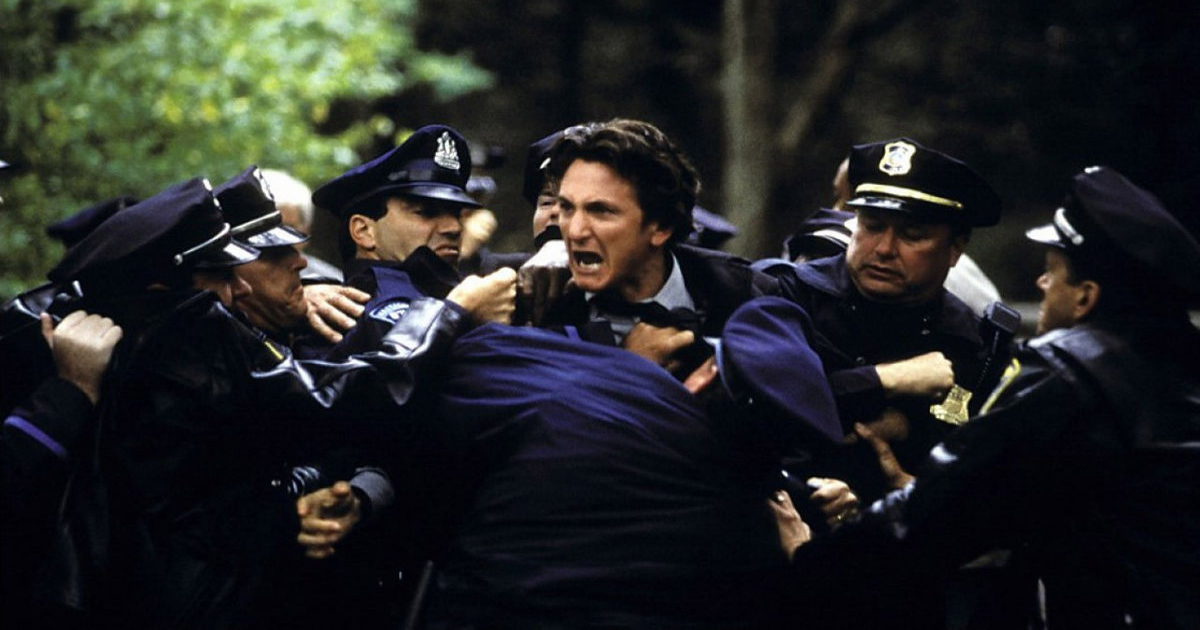
Eastwood tackles the material in Mystic River with a sure and confident hand. It also represents a unique departure from some of his other films. Much of the action takes place under the cover of darkness, and Eastwood is able to find beauty in that darkness. The filmmaker focuses on a character’s eyes or the gleam of a weapon, for instance, as darkness permeates most of the scene.
For the scenes that take place during the day, the filmmaker opts for tight close-ups that linger over the emotions of his impressive cast. There is something uncomfortably intimate about Mystic River, and that has much to do with the subject matter. None of this story is particularly easy to digest, and Eastwood adds to that discomfort with his choices to frame scenes in such a way that’s almost intrusive. The audience feels a growing sense of dread and tension as more of the story unfolds.
Using Lehane’s novel and Brian Helgeland’s screenplay as a blueprint, Eastwood profoundly explores generational trauma and how the sins of the past can leave a permanent mark on our present. Even though the abuse only happened to Dave, the effects of the event leave a mark on all three friends, with Dave being the primary victim and the others feeling a sense of survivor’s guilt for not being subjected to it themselves.
The ordeal forever changes their union because they’re never quite able to look at each other the same way again, as each friend deals with the trauma differently. Jimmy is stunned by the act of abuse but can’t give Dave the support he needs, which then bleeds into their present when Jimmy begins to suspect that Dave had something to do with his daughter’s murder. He doesn’t want to consider that his friend would do something like this because of the trauma he endured as a child, but as evidence mounts against him, Jimmy has to decide if friendship and loyalty overshadow his need for vigilante justice. The story is rich with so many complexities that make it some of Eastwood’s most compelling work as a filmmaker.
Eastwood also takes his time with the story and lets it unfold as it should. Mystic River is very nuanced, and he knows he’s dealing with heartbreaking subject matter that requires patience and respect. The story is grounded in so much reality that Eastwood seems keenly aware that a viewer might be an actual victim of this kind of abuse themselves, so he delicately approaches the topic and gives it the emotional weight it deserves.
He also shows the uncomfortable side of abuse where the victim, unfortunately, can be shamed because of the event. Dave becomes an outsider later in his life, even with his close friends, something that sadly comes along with this kind of trauma. Eastwood approaches all of this responsibly and provides a very balanced outlook to all the events transpiring on screen.
Mystic River has become known for its powerhouse performances, and Eastwood pulls the very best from his ensemble cast. While the scenes with the young actors are brief in the beginning, they set the tone of who these people will be twenty-five years later. Dave becomes the outcast because of the event; Jimmy lacks empathy and doesn’t trust authority, while Sean becomes the grounded one of the bunch and a police officer in an attempt to prevent a tragedy like this from ever happening again.
Clint Eastwood Pulls Powerhouse Performances From His Cast
Tim Robbins, Sean Penn, and Kevin Bacon do a great job conveying the unspoken tension between all three of these characters. There is a sense of loyalty, but so much has taken place over the years that it has forced them all to lead very different lives. As a group, they are uniformly excellent. You feel the history between the characters and the bonds that were broken, only to be reopened by a new traumatic event.
On their own, Penn gives the performance of a lifetime as Jimmy, and it’s not a shock that this turn finally earned him his first Academy Award for Best Actor. Penn is a dominant presence in all of his scenes, and there is a sense of uncertainty whenever he’s around because you don’t know exactly what move he will make.
That’s not to say he doesn’t display layers. All of that bravado is broken once he finds out his daughter is murdered. It’s hard to pinpoint a director’s best scene on film, but what Eastwood pulls out of Penn during the “Is that my daughter?” sequence represents some of his very best work as a filmmaker.
Robbins also received an Academy Award for Best Supporting Actor for his work here, representing a much-deserved win. As Dave, Robbins is the tragic and emotional heart of the story. The viewer feels instant empathy for Dave due to what he went through as a child, but you’re also left questioning everything when it seems like Dave could be the one who murdered Katie.
Robbins keeps you on your toes throughout, making you question his innocence while also seeing the tenderness in him as he interacts with his own child, who is just about the age he was when he was abused. As for Bacon, of the three male leads, he gives the most subdued performance, but it suits the character. He’s trying to make everything right and keep it all together. It’s a subtle performance that carries its own emotional weight.
Eastwood also makes the supporting roles worthy of attention. Marcia Gay Harding, as Dave’s wife Celeste, puts in powerful work here that earned her a Best Supporting Actress Oscar nomination, while Laura Linney more than holds her own with Penn as his second wife, Annabeth. In addition, Laurence Fishburne also fills in as Sgt. Whitey Powers in another excellent part.
Mystic River is a haunting and poetic motion picture that showcases a director laying it all out on the table. Eastwood gives the audience everything he has as a director and pours it out across the screen in a film that is just as powerful twenty years after its initial release.
Clint Eastwood
Clint Eastwood’s Most Iconic Non-Western Role Was Only Possible Because Of This Actor

SUMMARY
Clint Eastwood’s role in Dirty Harry is considered one of his most iconic, and the film is a classic in the crime genre.
Paul Newman initially turned down the role of Harry Callahan in Dirty Harry but recommended Clint Eastwood for the part.
Newman declined the role due to his liberal beliefs, and Eastwood’s portrayal of Callahan differed from Newman’s perspective, but both respected each other.
SCREENRANT VIDEO OF THE DAY

Although Clint Eastwood first built his impressive career on Western movies like The Man with No Name franchise and The Outlaw Josey Wales, the actor’s biggest non-Western role in Dirty Harry is one of his most iconic, and it might have never happened without this one actor. Clint Eastwood began acting in the 1950s, and over several decades, became a staple in the Western genre. What makes Eastwood stand out is the fact that he has not only appeared in countless films, but has also directed them himself. Films like Unforgiven and Gran Torino have defined his career. However, Dirty Harry is by far one of Clint Eastwood’s best films.
In 1971, Clint Eastwood starred in the neo-noir action film Dirty Harry. The film, and its adjoining sequels, follow Inspector “Dirty” Harry Callahan, a rugged detective that is on a hunt for a psychopathic serial killer named Scorpio. The Dirty Harry franchise lasted from 1971 to 1988, and has since been considered a classic. In fact, Dirty Harry was selected for preservation in the United States National Film Registry by the Library of Congress because of its cultural significance. However, this film might have been vastly different if Clint Eastwood had never been in it, and scarily enough, this definitely could have happened back in 1971.
Paul Newman Rejected Dirty Harry Before Suggesting Clint Eastwood For The Role
Dirty Harry went through many production challenges before it was actually made, and one of those included casting the iconic detective. In the film’s early stages, the role was offered to actors such as John Wayne, Robert Mitchum, Steve McQueen, and Burt Lancaster. However, for various reasons, including the violence that permeates the film, these actors all declined. For a time, Frank Sinatra was attached to the project, but he also eventually left the production. In reality, Clint Eastwood wasn’t even in the cards for portraying Dirty Harry, but his big break came when Paul Newman was offered and declined the role.
Paul Newman, like many amazing actors before him, was offered the role of Harry Callahan, but ultimately said no. However, what makes his refusal stand out among the rest is that he recommended another actor that could be perfect for the role: Clint Eastwood. At this time, Eastwood was in post-production for his first film Play Misty for Me, meaning his career was taking something of a turn. Also, unlike his predecessors, Eastwood joined up with Dirty Harry, just as Newman thought he would. Because of his Western roots, the violence and aggression that made up Dirty Harry didn’t bother Eastwood at all.
Why Paul Newman Turned Down Dirty Harry
Paul Newman turning down the leading role in Dirty Harry may not seem too surprising considering the host of other actors that also declined the movie, but Newman definitely had his reasons. While previous actors had condemned the movie for its incredible violence and themes of “the ends justify the means,” Newman refused to take the role because of his political beliefs. Since Harry Callahan was a renegade cop, intent on catching a serial killer no matter the cost or the rules that would be broken, Newman saw this character as too right-wing for his own liberal beliefs.
Paul Newman was an outspoken liberal during his life. He was open about his beliefs, so much so that he even made it onto Richard Nixon’s enemies list due to his opposition of the Vietnam War. Other issues that Newman spoke out for included gay rights and same-sex marriage, the decrease in production and use of nuclear weapons, and global warming. As a result of his politics, Newman quickly denied the role of Harry Callahan. In an interview with Entertainment Weekly as reported by Far Out Magazine, Clint Eastwood commented that he didn’t view Callahan in the way Newman did, but still respected him as an actor and a man.
Would Dirty Harry Have Been So Successful Without Clint Eastwood?
Ultimately, it’s hard to say whether Dirty Harry would have been successful without Clint Eastwood. Arguably, any big-time actor could have made the film succeed solely based on their fame. However, one aspect of Dirty Harry and its carousel of actors is that the movie had various scripts, all with different plots. So, if Dirty Harry had been in a different location with a different serial killer and a different lead actor, there’s a chance it wouldn’t have been nearly as successful. In the end, Dirty Harry is a signature for Clint Eastwood, and most likely, audiences are lucky that it was made the way it was.
Clint Eastwood
The story of how Clint Eastwood prevented Ron Howard from embarrassment

A star of American cinema both in front of and behind the camera, Ron Howard is often forgotten when recalling the greatest directors of modern cinema, yet his contributions to the art form remain unmatched. Working with the likes of Tom Hanks, Chris Hemsworth, Russell Crowe and John Wayne, Howard has brought such classics as Apollo 13, A Beautiful Mind and Rush to the big screen.
Entering the industry in the late 1950s and 1960s, Howard started his career as an actor, making a name for himself in shows like Just Dennis and The Andy Griffith Show before his role in 1970s Happy Days would catapult him to national acclaim. His directorial debut would come at a similar time, helming 1977’s Grand Theft Auto, the ropey first movie in a filmography that would later become known for its abundance of quality.
Known for his acting talents, Howard wouldn’t become a fully-fledged director in the eyes of the general public until the 1980s, when he worked with Tom Hanks on 1984’s Splash and George Lucas for the 1988 cult favourite Willow.
With hopes of becoming the new Star Wars, Willow was instead a peculiar fantasy tale that told the story of a young farmer who is chosen to undertake the challenge to protect a magical baby from an evil queen. Starring the likes of Warwick Davis, Val Kilmer and Joanne Whalley, the film failed to make a considerable dent in pop culture at the time, largely being ridiculed by critics and audiences alike.
Screened at the Cannes Film Festival, the movie was spared humiliation by none other than Clint Eastwood, who saw the craftsmanship behind the picture, as described by Ron’s daughter, Bryce Dallas Howard.
Speaking to Daily Mail, the actor recalled: “My dad made a film called Willow when he was a young filmmaker, which screened at the Cannes Film Festival and people were booing afterwards. It was obviously so painful for him, and Clint, who he didn’t know at that time, stood up and gave him a standing ovation and then everyone else stood up because Clint did”.
Dallas Howard, who worked with Eastwood on the 2010 movie Hereafter, became very fond of Eastwood as a result, looking up to him as an exemplary Hollywood talent. “Clint puts himself out there for people,” she added, “As a director he is very cool, very relaxed, there’s no yelling ‘action’ or ‘cut’. He just says: ‘You know when you’re ready.’ I told my dad he should do that!”.
Take a look at the trailer for Howard’s 1988 fantasy flick below.
Trending
-

 Entertainment1 year ago
Entertainment1 year agoJohn Wayne’s son speaks on military service, Hollywood life and his dad, ‘The Duke’ – My Blog
-

 Entertainment1 year ago
Entertainment1 year ago40 Legendary John Wayne Quotes – My Blog
-

 Entertainment1 year ago
Entertainment1 year agoNew biography reveals the real John Wayne – My Blog
-

 Entertainment2 years ago
Entertainment2 years agoWhy one POPULAR ACTOR was FIRED from THE SONS OF KATIE ELDER and lost his career as a result! – Old western – My Blog
-

 Entertainment1 year ago
Entertainment1 year agoRio Lobo (1970) marked the last collaboration between John Wayne and Howard Hawks. – My Blog
-

 Entertainment1 year ago
Entertainment1 year agoHow Maureen O’Hara Broke Her Hand During Iconic Scene With John Wayne – My Blog
-

 Entertainment1 year ago
Entertainment1 year agoJohn Wayne and the ‘Bonanza’ Cast Appeared in This Epic Coors Light Commercial – My Blog
-

 Entertainment1 year ago
Entertainment1 year agoDid John Wayne really have a good time filming 1972’s The Cowboys? – My Blog

